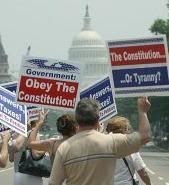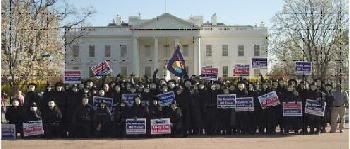Credentials versus Evidence
Sent : Tuesday, March 6, 2007 6:22 PM
 Yet another "expert" opinion poo-pooing the 861 evidence was recently brought to my attention. It would be a full-time job to respond to all of them (the status quo always has a lot of beneficiaries, and therefore proponents), but the general gist of most of them can be addressed with one response. The example I'll use this time comes from a professor of law at the George Washington University Law School (in DC), so one would think that it would at least be a little more credible than the remarks of some untrained paper-pusher. Here is the link to the (attempted) refutation of the 861 evidence:
Yet another "expert" opinion poo-pooing the 861 evidence was recently brought to my attention. It would be a full-time job to respond to all of them (the status quo always has a lot of beneficiaries, and therefore proponents), but the general gist of most of them can be addressed with one response. The example I'll use this time comes from a professor of law at the George Washington University Law School (in DC), so one would think that it would at least be a little more credible than the remarks of some untrained paper-pusher. Here is the link to the (attempted) refutation of the 861 evidence:Read more here.
Also see larkenrose.blogspot.com.












2 Comments:
Dear Mr.Larkin,
With all due respect, I believe you need to take time and read from Ctc on this issue. I will not try to "out wind" you, so I'll edit a copy of: A Brief Analysis
© Pete Hendrickson
The “861” argument possibly reveals the origin of its error with its very name, a mere code section rather than the law that section represents (or, in this case, misrepresents). Treating code sections as law is an easily made and widely-shared mistake. In this case, rather than leading to despair as it often does, it misleads to an erroneously positive conclusion. Because of this mistake, the research leading to the construction of the argument overlooked the fact that the actual law at 213(c), by exclusively and explicitly identifying non-resident aliens as those to whom 217's rules (codified at 861, 862, and others) apply, simultaneously excludes other categories of persons from those rules.
"Inclusio unius est exclusio alterius. The inclusion of one is the exclusion of another. The certain designation of one person is an absolute exclusion of all others. ... This doctrine decrees that where law expressly describes [a] particular situation to which it shall apply, an irrefutable inference must be drawn that what is omitted or excluded was intended to be omitted or excluded."
Black's Law Dictionary, 6th edition.
What the statute clearly says is: "Gross income" (for purposes of determining “taxable income”) generally means "..." , but in the case of non-resident aliens, and others receiving "income" from federal possessions-- and only in the case of those classes of persons-- it is limited to "income" associated with the sources listed in 217(a). This is the reason why 217 exists-- if the special classes identified in 217(a) were not being treated uniquely, 217 (and consequently, 861, etc.) would not exist. The misconception arises from the fact that the specification that 217’s provisions only apply to non-resident aliens and federal possession “income” recipients has been moved, in the code, to section 872, out of immediate view. But it is still the law. (The meaning of “nonresident alien” will be addressed a little further on).
The argument, having established its expectations with the initial misunderstanding, then perceives available evidence in the light of that error. It is, however, obliged to strain the plain words of the sections upon which it seizes, in order to find the expected meaning. For example, at one point the argument cites 26 CFR 1.861-8, which declares that, “The rules contained in this section apply in determining taxable income of the taxpayer from specific sources and activities under other sections of the code, referred to in this section as operative sections.” This is pretty easily understood as saying that “it is in (and only in) those sections designated as “operative sections” that these rules will apply”. The 861 argument finds in this language, apparently based on the common meaning of ‘operative’, that only “operative sections” of the law are operative in any respect at all, in other words, that sections not identified as “operative sections” are a nullity. It intends thereby to find support of its proposition that only externally-sourced receipts are actually taxed, which would perhaps appear true, if the qualifying elements in the section’s language are disregarded.
Unfortunately, not only is this position unsupportable on its face, it is contradictory of a substantial part of the argument’s own previous observations, correctly pointing out that custom-defined terms are not to be understood as having the conventional meaning of the words of which they are composed. Furthermore, the argument itself immediately draws our attention to a refutation of this position, proceeding to cite 26 CFR 1.861-8(f)(1) (where 26 CFR 1.861-8 has indicated the list of “operative sections” is located), which says, “The operative sections of the Code which require the determination of taxable income of the taxpayer from specific sources or activities and which give rise to statutory groupings to which this section is applicable include…”. If the term “operative sections” had the meaning which the argument prefers, this regulatory portion would read, “The operative sections of the Code, which require the determination of taxable income of the taxpayer from specific sources or activities and which give rise to statutory groupings to which this section is applicable, include…”. You will note the commas.
The argument also overlooks some of the implications of context. For example, it references Sec. 1.861-1 of 26 CFR and makes much of the section’s language “…determine the sources of income for purposes of the income tax”, but without observing that the section is located within the portion of the regulations identified as dealing with the application of the tax to non-resident aliens. The regulations are entirely subordinate to the statute, and are incapable of expanding its meaning at all, so this is irrelevant, but as in the matter of rules of construction, it shows how the argument suffers from a tendency to seek evidence to cite which satisfies a preconception, while ignoring that which is contradictory. Viewed without the lens of that preconception, it is easy to understand the cited language as implying the qualification, “when such determinations are indicated as appropriate”. This is particularly so when the language is part of the regulatory implementation of a statute specifically providing for such determinations-- for the specified classes of non-resident aliens and citizens receiving “income” from federal possessions.
In fact, a great deal is made, in the 861 argument, of selected headings, locations, section titles, etc., to suggest or infer the credibility of its interpretation of the meaning or purpose of the “source rules”, virtually all of which must be disregarded. Not only is the code an irrelevancy, as declared by the House Office of Law Revision Counsel:
Certain titles of the Code have been enacted into positive law, and pursuant to section 204 of title 1 of the Code, the text of those titles is legal evidence of the law contained in those titles. The other titles of the Code are prima facie evidence of the laws contained in those titles. The following titles of the Code have been enacted into positive law: 1, 3, 4, 5, 9, 10, 11, 13, 14, 17, 18, 23, 28, 31, 32, 35, 36, 37, 38, 39, 44, 46, and 49.,
clarified by the Government Printing Office:
NOTE: Of the 50 titles, only 23 have been enacted into positive (statutory) law. These titles are 1, 3, 4, 5, 9, 10, 11, 13, 14, 17, 18, 23, 28, 31, 32, 35, 36, 37, 38, 39, 44, 46, and 49. When a title of the Code was enacted into positive law, the text of the title became legal evidence of the law. Titles that have not been enacted into positive law are only prima facie evidence of the law. In that case, the Statutes at Large still govern.
and internally referenced by section 7806 (individually enacted):
Sec. 7806. - Construction of title
(b) Arrangement and classification
No inference, implication, or presumption of legislative construction shall be drawn or made by reason of the location or grouping of any particular section or provision or portion of this title, nor shall any table of contents, table of cross references, or similar outline, analysis, or descriptive matter relating to the contents of this title be given any legal effect.,
but the meaning and purpose of the source rules is, again, clearly and unequivocally spelled out in plain language in the law, at 213(c) and 217(a). Thus, such translations and interpretations amount to an effort to not only find what is not there, but to contradict what is.
Though citing, and acknowledging the meaning of, section 7806, the argument nonetheless proceeds to ignore it, according-- in particular-- great significance to the title of Part I of Subchapter N- “Source rules and other general rules relating to foreign income”. This is taken as evidence that “income” only comprises gains received from foreign entities and that the source rules apply to all “income”, rather than being understood just as it reads: “Foreign income has its own special rules, and this is where they are found.”
The former interpretation is reflective of what might be the argument’s basic tautology-- having assumed that “income” can only be foreign (in an effort to square its perfectly accurate perception that private-sector, union-state persons cannot Constitutionally be directly taxed, with the apparently contradictory construction of the “income” tax as represented in the code), the argument deduces from this title that, therefore, source rules applicable to foreign “income” are applicable to all “income”. Conversely, the argument presupposes that the source rules apply to all “income”, and therefore derive from the Part’s title that all “income” must be foreign. Together, in fact, these mutually defensive and fully reversible assumptions and deductions constitute the whole of the 861 argument. The title of Part I of Subchapter N is an awkward statement of the part’s contents-- in light of the actual statute behind the section, it would be better put as, “Source rules and other general rules relating to the income of foreigners, or that received by citizens while within foreign jurisdictions.”
In any case, even if the code were taken as the law itself, there is no reasonable basis for assuming that the existence of a reference to a particular specification of "income from sources within the United States", found anywhere and in any form, is intended to apply to YOU (read: any particular person), absent language to that effect. It clearly DOES NOT apply to you when a specification of those to whom it DOES apply is provided, and you are not included. (The question of just who IS a nonresident alien will be addressed a little further on).
Contrary to a central assertion of the 861 thesis, Congress was under no legal obligation to identify carefully circumscribed "sources" in order to remain within its Constitutional limits-- it had already accomplished that from the very beginning of the "income" tax in 1862 by legislating in conformity to the limited legal meaning of “income”, a meaning considerably broader than has been suggested by some researchers in the past, but far more limited than the government’s preferred general misconstruction as “all that comes in”. In fact, even that far back, in the first iteration of the “general definition of income” (as opposed to the particular definitions of “income” found elsewhere in this and subsequent revenue acts, where the word does not appear), the “source” reference is deployed in such a fashion as to demonstrate its lack of special significance or underlying association with foreign “income” or persons:
“Sec. 90. And be it further enacted, That there shall be levied, collected, and paid annually, upon the annual gains, profits, or income of every person residing in the United States, whether derived from any kind of property, rents, interest, dividends, salaries, or from any profession, trade, employment, or vocation carried on in the United States or elsewhere, or from any other source whatever,”
The revenue Act of 1913, to which the 1921 act is more directly supplemental, put is this way:
“That there shall be levied, assessed, collected and paid annually upon the entire net income arising or accruing from all sources in the preceding calendar year to every citizen of the United States, whether residing at home or abroad, and to every person residing in the United States, though not a citizen thereof, a tax of 1 per centum per annum upon such income, except as hereinafter provided; and a like tax shall be assessed, levied, collected and paid annually upon the entire net income from all property owned and of every business, trade, or profession carried on in the United States by persons residing elsewhere.”
*****
All of the above having been said, the foundational intuitions of the 861 argument’s proponents are sound. Congress is indeed circumscribed in the reach of its taxing power; it does confine itself accordingly; and it does do that in a fashion designed (or allowed) to be misunderstood. But the mechanism is not the “source rules”, or anything else requiring assumptions as to meaning, or inferences, implications, and suggestions.
Having openly imposed the tax upon federal workers and those conducting federally-connected business, as well as certain licensed activities, Congress has also established a clever scheme by which other Americans are led to create or leave unchallenged legal evidence that they belong to one of those groups, allowing the IRS to assert that their earnings comprise “income” subject to the tax. It is for this reason that every business in America is “encouraged”-- almost, though not quite, at bayonet point-- to sign documents declaring the amount of “wages as defined at section 3401” (remuneration of federal officers and employees) paid to their workers, rather than just “wages”, or “money”. It is for this reason that every American business is similarly “encouraged” to submit to the IRS documents alleging that all payment of greater than $600 made to other businesses or contractors constitute “gains, profits, or income” paid in the course of the remitter’s “trade or business” (defined within the law as meaning “the performance of the functions of a public office”). There is no program in place attempting to generate evidence that the average American is receiving earnings from Europe.
Indeed, even when circumstances require the laying of cards on the table, so to speak, the premises of the 861 argument are entirely ignored. No effort is made by the government to secure admissions from, or to present evidence against, the target of a tax prosecution to the effect that he or she received “income” from Canada or Mexico or other foreign “sources” (or is a “nonresident alien”) in order to establish the government’s claims. On the other hand, a great deal of effort indeed is devoted to securing admissions, or presenting evidence, regarding the target’s receipt of “income”, period, without regard to its “source”. And such evidence takes the form of, and such admissions are based upon, the W-2’s and 1099’s and other documents used to facilitate the scheme to which I referred above.
Coincidentally, within the context produced through the tax law’s custom definitions, citizens of union-states are indeed non-resident aliens, relative to the federal government. Within that context, the extremely narrow meaning of “United States” informs the 217 rules so as to make them generally consistent with the legal meaning of “income”-- but still leaves such citizens mired in the scheme outlined above. Thus, unless that legal meaning of "income" is understood and invoked, most will still find their earnings, under those rules, subject to tax... Regardless, the making of that case has not been attempted within the 861 argument. It should be, for it would be much stronger as a consequence (although still wrong), but even then only if the legal nature of "income" is incorporated at a fundamental level.
Practically speaking, though, whether one is or is not a nonresident alien is generally moot. Most actual “income” is paid within the “United States”, and most of that which is alleged to have been received by private-sector, union state citizens is alleged to have been paid from within the “United States” as well. Overcoming the allegation of having been paid such “income” eliminates the issue of one’s citizenship or residency status. Regardless, I certainly urge all private-sector, union-state citizens to always decline explicitly declaring themselves to be a United States citizen or resident. Rather, declare the appropriate union-state citizenship and residency and leave it to others to infer anything further.
I take no pleasure in making my argument against the 861 argument. The perspective which inspired it-- that government must be limited in power, and unrestricted direct taxation is incompatible with that principle-- are enlightened, and the spirit which developed it is courageous and determined to uphold the rule of law. However, there are brave and worthy souls risking much upon its accuracy today, and I feel that they may suffer for that decision. It is my hope that making this critique available will spare some of these patriots needless harm.
Happily, most of those who have relied upon the argument will have done nothing to harm their legal status, as acting under its prescriptions will have caused most to file, or not file, documents just as they should have (presuming that correcting erroneous evidentiary documents produced by others about them as to the receipt of "wages" or proceeds of a "trade or business" is included in the protocol). No infirmity arises simply because one has done the right thing without clearly understanding why. But, those who will inevitably be challenged over such filings will find that clear understanding will serve them much better than the alternative in the resulting legal contest.
You’ve got to look deeper than the code if you want the liberating truth.
[just food for thought]
Rose Larkin did a fine Job... And made it easy for even the Laymen to Understand.
Fred... Your rebuttals to WHY NOT are even Finer Sir.
Your Last post here Fred... 1 page to 39 Pages, with no Congressional authority... This topic is HOT!
I'd like to know WHEN, And WHO... Made this Change. Someone did it some when. and someone Else knows Who "SOMEONE" is.
I think alot of answers would surface, if this Someone, and the When, came to light.
My Question is this:
"Who is Scrambling Right now, To once again change the LAWS and the IRC to say what "THEY WANT IT TO SAY"?
And who is guarding our written Laws right now, to ensure that No one can "UNLAWFULLY" Change them again?
Post a Comment
Subscribe to Post Comments [Atom]
<< Home